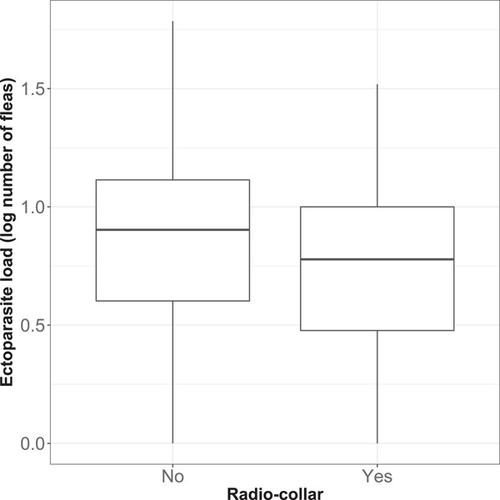当前位置:
X-MOL 学术
›
J. Wildl. Manage.
›
论文详情
Our official English website, www.x-mol.net, welcomes your
feedback! (Note: you will need to create a separate account there.)
Effects of Radio-Collars are not Contingent on Socioecological Conditions in Degus
Journal of Wildlife Management ( IF 1.9 ) Pub Date : 2021-07-20 , DOI: 10.1002/jwmg.22098 Luis A. Ebensperger 1 , Verónica Quirici 2 , Valentina Bunster 1 , Cecilia León 1 , Juan Ramírez‐Estrada 1 , Loren D. Hayes 3
Journal of Wildlife Management ( IF 1.9 ) Pub Date : 2021-07-20 , DOI: 10.1002/jwmg.22098 Luis A. Ebensperger 1 , Verónica Quirici 2 , Valentina Bunster 1 , Cecilia León 1 , Juan Ramírez‐Estrada 1 , Loren D. Hayes 3
Affiliation

|
Species-specific research on free-ranging mammals reveals a diversity of effects of radio-collars on behavior, body condition, and fitness. Although these studies indicate rather limited direct effects, radio-collars may cause effects influenced by socio-ecological conditions. Using a 7-year study on a natural population of group-living degus (Octodon degus), we tested the hypothesis that ecological (food availability, burrow density) and social (group size, group male-to-female ratio) conditions modulate effects of radio-collars on body condition (e.g., body mass, ecto- and endoparasite loads, fecal cortisol metabolites) and direct fitness (litter size, adult survival). We determined the effect of radio-collar use on degus by contrasting the presence or absence of radio-collars, quantifying the effects of the number of days carrying a radio-collar, and the relative mass of radio-collars worn by degus in central Chile between 2009 and 2015. Radio-collar use was not associated with direct effects on litter size, adult survival, or with body mass and fecal cortisol metabolites but was linked to low ecto- and endoparasite loads. These seemingly positive effects may reflect decreased mobility, or a research bias for radio-collaring larger, healthier individuals. There was no evidence that ecological and social conditions modulated radio-collar effects on degu body condition and direct fitness. These findings are consistent with evidence from other mammal studies that reported no appreciable detrimental direct or indirect effects of radio-collars. © 2021 The Wildlife Society.
中文翻译:

无线电项圈的影响并不取决于八齿鼠的社会生态条件
针对自由放养哺乳动物的特定物种研究揭示了无线电项圈对行为、身体状况和健康的多种影响。尽管这些研究表明直接影响相当有限,但无线电项圈可能会造成受社会生态条件影响的影响。使用对群居八齿鼠(Octodon degus)自然种群的 7 年研究),我们测试了生态(食物供应、洞穴密度)和社会(群体规模、群体男女比例)条件调节无线电项圈对身体状况(例如,体重、体外和体内寄生虫负荷)的影响的假设、粪便皮质醇代谢物)和直接适应性(窝产仔数、成虫存活率)。我们通过对比无线电项圈的存在与否,量化携带无线电项圈的天数的影响,以及智利中部八齿鼠佩戴的无线电项圈的相对质量,确定无线电项圈的使用对八齿鼠的影响2009 年至 2015 年之间。无线电项圈的使用与对窝产仔数、成虫存活率或体重和粪便皮质醇代谢物的直接影响无关,但与体外和体内寄生虫负荷低有关。这些看似积极的影响可能反映了流动性下降,或者对戴无线电项圈的更大、更健康的人的研究偏见。没有证据表明生态和社会条件会调节无线电项圈对八齿鼠身体状况和直接健康的影响。这些发现与其他哺乳动物研究的证据一致,这些研究报告称无线电项圈没有明显的有害直接或间接影响。© 2021 野生动物协会。
更新日期:2021-08-11
中文翻译:

无线电项圈的影响并不取决于八齿鼠的社会生态条件
针对自由放养哺乳动物的特定物种研究揭示了无线电项圈对行为、身体状况和健康的多种影响。尽管这些研究表明直接影响相当有限,但无线电项圈可能会造成受社会生态条件影响的影响。使用对群居八齿鼠(Octodon degus)自然种群的 7 年研究),我们测试了生态(食物供应、洞穴密度)和社会(群体规模、群体男女比例)条件调节无线电项圈对身体状况(例如,体重、体外和体内寄生虫负荷)的影响的假设、粪便皮质醇代谢物)和直接适应性(窝产仔数、成虫存活率)。我们通过对比无线电项圈的存在与否,量化携带无线电项圈的天数的影响,以及智利中部八齿鼠佩戴的无线电项圈的相对质量,确定无线电项圈的使用对八齿鼠的影响2009 年至 2015 年之间。无线电项圈的使用与对窝产仔数、成虫存活率或体重和粪便皮质醇代谢物的直接影响无关,但与体外和体内寄生虫负荷低有关。这些看似积极的影响可能反映了流动性下降,或者对戴无线电项圈的更大、更健康的人的研究偏见。没有证据表明生态和社会条件会调节无线电项圈对八齿鼠身体状况和直接健康的影响。这些发现与其他哺乳动物研究的证据一致,这些研究报告称无线电项圈没有明显的有害直接或间接影响。© 2021 野生动物协会。











































 京公网安备 11010802027423号
京公网安备 11010802027423号